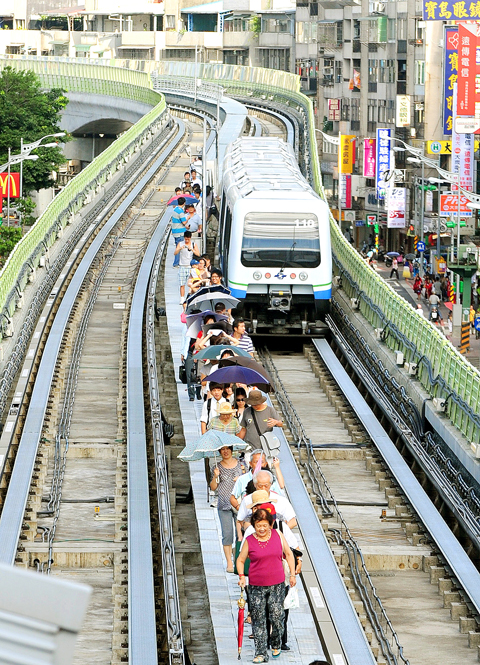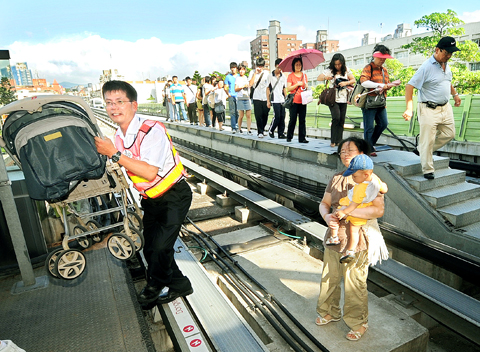The Taipei City MRT’s Neihu and Muzha lines were suspended yesterday afternoon after a sudden power outage, forcing about 700 passengers to walk down the elevated rail lines to return to station platforms after trains stopped between stations.
The lines are scheduled to resume operating at 6am today. The suspension of services yesterday was the first serious system failure on the Neihu Line since it began operations last Saturday.
A total of 21 trains running on the two lines came to a halt at 3:27pm after the control center detected a warning signal indicating a malfunction in the power supply, Taipei Rapid Transit Corp (TRTC) general manager Tsay Huei-sheng (蔡輝昇) said.

PHOTO: FANG PIN-CHAO, TAIPEI TIMES
The malfunction caused power to be cut off and the whole Brown Line was shut down, Tsay said. The company began evacuating passengers according to emergency procedures at 3:44pm after it failed to restore power, he said.
TRTC said only three trains stopped between stations — one between Neihu District’s Gangqian and Wende stations; one between Zhongshan District’s Dazhi and Jiannan stations; and one between Zhongshan District’s Zhongshan Junion High School and Songshan Airport stations.
However, Taipei Times reporters saw another train stopped between Gangqian and Wende stations, and trains stopped in both directions north of Zhongshan Junior High School Station. The TRTC declined to comment on the discrepancy.

PHOTO: FANG PIN-CHAO, TAIPEI TIMES
All passengers, including those on the trains that stopped between stations, were evacuated by 4:20pm, and the company provided free shuttle buses along the lines to take them to their destinations, Tsay said, adding that the TRTC had sent staff to evacuate passengers as soon as possible.
Some passengers from the stranded trains, however, slammed the TRTC for failing to respond to the incident promptly, leaving some waiting inside the cars for more than half an hour without air conditioning or any explanation.
“Nobody told us what happened and we were stuck inside the cars without air conditioning. Their emergency response ability is a joke,” a female passenger complained after walking back to Zhongshan Junior High School Station.

PHOTO: LU CHUN-WEI, TAIPEI TIMES
STRANDED
A Taipei Times editor, who was in the stranded train near Gangqian Station, said that passengers arriving at the station prior to the power shutdown were not able to board or alight because the doors did not open. The train then moved off and stopped a few seconds later well beyond the station. After a few moments, it started again, but then lurched to a halt, pitching passengers forward.
An announcement came over the loudspeaker that there had been an incident and that passengers should wait. Announcements, repeated every few minutes, were in Mandarin only. Several announcements were made over the next 20 minutes requesting that passengers wait “patiently.” At 25 minutes, the power and air conditioning suddenly went off. There was no announcement as to how long passengers would be expected to wait. After 30 minutes, and after receiving no instructions from MRT staff, three male passengers pried open the doors and stepped outside.
A female MRT employee ran up to the carriage from Gangqian Station. The men asked if the passengers should get off and walk to the station. She said “yes” in an exasperated tone, as if this were obvious, despite the fact that the last instruction to be issued was “wait patiently” on their own.
The staffer disappeared and no one else came to assist. Passengers alighted from the carriage, helping the infirm and elderly, before walking slowly between the two tracks back to the station. The sheer number of passengers meant that it took at least 20 minutes for them to reach Gangqian Station, no more than 200m away.
APOLOGY
Later yesterday, Taipei Mayor Hau Lung-bin (郝龍斌) apologized for the inconvenience the incident had caused the public, and demanded that Taipei city’s Department of Rapid Transit System solve the false alarms and malfunctions that have hindered the Neihu Line since its operation began less than a week ago.
“We are prioritizing our efforts on fixing the system’s false alarms and stabilizing it in the shortest time,” Hau said.
Hau acknowledged the problematic system integration of the Neihu and Muzha lines could be the reason behind the frequent malfunctions and the shutdown of the lines yesterday, but said the city government did not plan to halt the operation of the two lines to fix the problem.
The Neihu Line, an extension of the Muzha Line, was designed to be compatible with the Muzha Line’s Matra system. The Neihu Line’s builder, Montreal-based Bombardier, sent software engineers to inspect the computer systems and improve the detection of false alarms last month.
Hau said the city government would ask Bombardier for compensation according to contract if the company fails to solve the system malfunctions.
Department Commissioner Tom Chang (常歧德) said his department and Bombardier were working to fix the problems and seeking to have the lines resume operation as soon as possible.
In compensation, the firm gave free one-day MRT passes and bus tickets to passengers who had to walk along the tracks to get back to the stations. The Taipei City’s Transportation Department will continue to provide free shuttle buses along the lines today, Tsay said.

‘FORM OF PROTEST’: The German Institute Taipei said it was ‘shocked’ to see Nazi symbolism used in connection with political aims as it condemned the incident Sung Chien-liang (宋建樑), who led efforts to recall Democratic Progressive Party (DPP) Legislator Lee Kun-cheng (李坤城), was released on bail of NT$80,000 yesterday amid an outcry over a Nazi armband he wore to questioning the night before. Sung arrived at the New Taipei City District Prosecutors’ Office for questioning in a recall petition forgery case on Tuesday night wearing a red armband bearing a swastika, carrying a copy of Adolf Hitler’s Mein Kampf and giving a Nazi salute. Sung left the building at 1:15am without the armband and apparently covering the book with a coat. This is a serious international scandal and Chinese

PERSONAL DATA: The implicated KMT members allegedly compiled their petitions by copying names from party lists without the consent of the people concerned Judicial authorities searched six locations yesterday and questioned six people, including one elderly Chinese Nationalist Party (KMT) member and five KMT Youth League associates, about alleged signature forgery and fraud relating to their recall efforts against two Democratic Progressive Party (DPP) legislators. After launching a probe into alleged signature forgery and related fraud in the KMT’s recall effort, prosecutors received a number of complaints, including about one petition that had 1,748 signatures of voters whose family members said they had already passed away, and also voters who said they did not approve the use of their name, Taipei Deputy Chief Prosecutor

UNDER ATTACK: Raymond Greene said there were 412 billion malicious threats in the Asia-Pacific region in the first half of 2023, with 55 percent targeting Taiwan Taiwan not only faces military intimidation from China, but is also on the front line of global cybersecurity threats, and it is taking action to counter those attacks, President William Lai (賴清德) said yesterday. Speaking at the opening of this year’s Cybersec Expo in Taipei, the president assured foreign diplomats and exhibitors that Taiwan remained committed to strengthening its defense against cyberattacks and enhancing the resilience of its digital infrastructure. Lai referenced a report from the National Security Bureau (NSB) indicating that the Government Service Network faced an average of 2.4 million intrusion attempts daily last year, more than double the figure

COUNTERINTELLIGENCE TRAINING: The ministry said 87.5 percent of the apprehended Chinese agents were reported by service members they tried to lure into becoming spies Taiwanese organized crime, illegal money lenders, temples and civic groups are complicit in Beijing’s infiltration of the armed forces, the Ministry of National Defense (MND) said in a report yesterday. Retired service members who had been turned to Beijing’s cause mainly relied on those channels to infiltrate the Taiwanese military, according to the report to be submitted to lawmakers ahead of tomorrow’s hearing on Chinese espionage in the military. Chinese intelligence typically used blackmail, Internet-based communications, bribery or debts to loan sharks to leverage active service personnel to do its bidding, it said. China’s main goals are to collect intelligence, and develop a